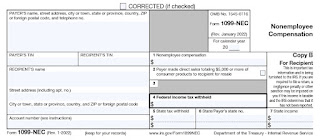Inflation adjustments to tax rules such as the individual tax brackets and standard deduction make sense to avoid "bracket creep" where inflation might put an employee into a higher bracket despite no increased earning power and ensures an appropriate amount of income is removed from taxation (the role played by the standard deduction and personal and dependent exemptions).
But some figures, such as filing thresholds for information reports such as 1099-INT and 1099-NEC, should not be adjusted for inflation as doing so will increase non-reporting otherwise known as the tax gap (amount of tax owed less what is actually collected). There are often proposals to increase the 1099-NEC filing threshold from $600 which was set in 1954 to its inflation adjusted amount of about $7,000 today. For example, see the proposed Small Business Paperwork Savings Act introduced 6/9/23 to increase the filing threshold for Form 1099-NEC from $600 to $5,000.
According to the IRS, the tax gap is about $500 billion a year. It stems from non-reporting of income and non-payment, as well as various tax errors made in filing. The GAO, IRS and others have known for many years that "compliance is higher when there is a third-party information reporting and withholding" (page 3 of Pub 5364). More specifically, the IRS reports that where income is subject to both information reporting and withholding, the compliance rate is about 99%! In contrast, where there is little to no information reporting or withholding, the compliance rate is about 45%! [page 6 of Pub 5364]
A tax gap means that compliant taxpayers are paying more to cover what non-compliant taxpayers are not paying that they actually owe. Since it has been shown for many years that information reporting reduces the tax gap, raising the filing threshold for Form 1099-NEC will mean far fewer forms will be issued and some taxpayers such as those who keep poor records or think that if they don't get an information form, the income isn't taxable, will not report the income - the tax gap will rise. Compliant taxpayers will have to cover more of total taxes.
Improvements in technology can make it easier to file information reporting forms. Last year, the IRS released IRIS that helps small businesses prepare most types of information returns and file them with the IRS. Hopefully this system will expand to allowing the filers to also get the 1099s to the recipients electronically, such as the IRS sending the information directly to the taxpayer's account that the IRS will be creating for taxpayers per the recent strategic plan under the IRA 2022 funding (page 24).
While 1099-NEC forms are provided to self-employed individuals who should be keeping business records, not all do or don't keep complete records. Thus, 1099-NEC forms are important. Could an alternative be some type of required recordkeeping by businesses? Possibly, but that is more challenging. Can rules be changed to reduce penalties on 1099-NEC filers? Yes. For example, if the recipient provided a wrong address or EIN, the penalty should be on the recipient, not the issuer. Should 1099-NEC filers be compensated for their efforts? Why not?
What do you think?









1 comment:
21st Century Taxation
Post a Comment